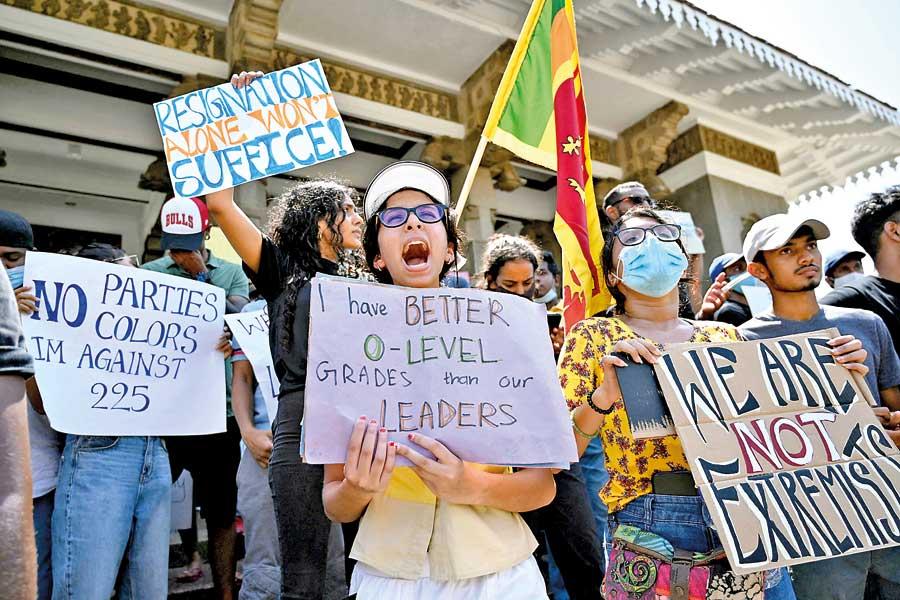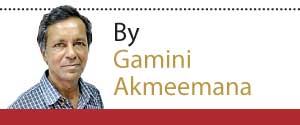Reply To:
Name - Reply Comment

The Aragalaya which began in late March 2022 culminated in the ouster of then President Gotabaya Rajapaksa
Standing at the checkout counter of the nearby Sathosa store, I heard a woman ask the young cashier about a box full of coupons next to him.
about a box full of coupons next to him.
“Oh, those are municipality coupons for low-income people,” the cashier said, giving her a coupon, adding that you have to go behind a municipal counsellor to get one. “But you’d be surprised. Even doctors come with these coupons to buy provisions. You should see their vehicles.”
This is a time of acid tests. I was tempted to ask if I could have a coupon if doctors were entitled to them. But I checked myself because I believe there is still a degree of self-respect and decency left in me after all the post-pandemic and post-2022 mayhem, so I checked myself.
“I saw a Muslim woman buying Rs. 25,000 worth of stuff with a coupon,” the woman said. “They get everything, while we Sinhalese are left stranded.”
The real danger to democracy isn’t just the unscrupulous, racist populist politician but the people who are all too ready to be swayed by the crowd-pleasing rhetoric.
The cashier smiled, but said nothing. Walking back home, I thought about these two streams of thought – well-off or better-off people taking advantage of what should go to the poor, and everyone blaming all economic woes on the minorities. Once, it was the Tamils. Now, it’s the Muslims’ turn.
As for the coupons, everything’s so complicated now because seemingly better off people too, have low or lower incomes than they used to have. No assumption here that all doctors are well off. But then, they definitely do not fit the municipality’s criteria for low-income groups. Though my income too, has taken a big hit since the pandemic, neither do I. That’s the long and short of it.
The Aragalaya (struggle) which began in late March 2022 and culminated in the ouster of then president Gotabaya Rajapaksa wasn’t entirely about Gotabaya despite the ubiquitous ‘Gotagohome’ slogan. The robbing of people’s assets by the privileged classes as well as targeting of minorities were prominent parts of that agenda. This was at the heart of its demand for an unprecedented systems change.
Many are pleased, even relieved, to think that the Aragalaya is dead, having been dealt with firmly by the new President Ranil Wickremasinghe. I beg to differ. It was overstretched and exhausted by July. But this is just a hiatus, and it will be back.
People made enormous sacrifices because here at last was a common voice, loud and fearless, for long-standing, submerged grievances
But more about that, later. For now, back to that overheard conversation. I remember wondering, during those bleak, crowded, nerves-on-edge, but exciting and hopeful days from April to July, when we had miles-long queues for diesel, petrol, kerosene and LP gas, why there wasn’t a single Aragalaya slogan on display along the queues here in Colombo, where the Aragalaya was at its highest pitch (incidentally, while fuel for vehicles is partially available since August with shorter queues, there is no kerosene to be had anywhere though prices have trebled. Millions of poor people cook with it, and its essential for the fisheries industry, but no one is even talking about it).
The lack of protest at the queues puzzled me. Presumably, some of these people were present at the Galle Face green (the principal protest site), too, at one time or another. I know one key cutter who distributed Rs. 6000 worth of food to protesters. People made enormous sacrifices because here at last was a common voice, loud and fearless, for long-standing, submerged grievances.
But at the fuel queues you had people playing cards, chatting, arguing about queue jumping, listening to loud music and even dancing past midnight. They were spending days on end in queues. Some died from exhaustion. But, as far as the gas and fuel queues were concerned, the Aragalaya may not have existed. It was a world apart.
This is an ethical issue. When you demand a systems change, it’s both socio-political, and not just an utopia about a new set of faces in the parliament. Politicians represent the people. When you demand better and more ethical standards from them, the same goes to the voters, too. ‘Gotagohome’ wasn’t just about one individual. Gotabaya Rajapaksa and his brothers too, are a creation of the system. They didn’t create it, they simply used it to their advantage. The struggle was about an entire society, a demand for the old amoral wheeler-dealer ways be thrown out and a new, ethical way of thinking in politics.
But it was running amok at the fuel queues. There was reportedly a secretive VIP fuel service at the Ceypetco’s main base while fuel mafias took over the queues. Gangs of three wheeler drivers controlled the queues and bought extra fuel to sell at black market prices, while privileged sections of society often did not have to queue up while fuel wasn’t available for ambulances. Fuel station workers could be bribed for extra fuel. It was a nightmare, completely contrary to the Aragalaya’s demands and expectations.
The Aragalaya achieved an unprecedented victory when it forced out the much feared, almighty Gotabaya Rajapaksa peacefully. But that doesn’t amount to a systems change, and that’s why it was so easy for Ranil Wickremasinghe to pick up from there and carry on ‘business as usual.’ The system’s change has to get into the hearts of guts of voters.
Many are pleased, even relieved, to think that the Aragalaya is dead, having been dealt with firmly by the new President Ranil Wickremasinghe. I beg to differ. It was overstretched and exhausted by July. But this is just a hiatus, and it will be back.
People of all types, persuasions, ethnic groups and ages, from housewives, pensioners, executives, the clergy to children and the disabled cried for a system change under the ‘Gotagohome’ slogan, and they succeeded (I think only the aadivasi people were absent, or were they there, too?). Even the racism of previous years was forgiven as all communities joined hands at the Green. But these people had no voice in the fuel and gas queues. It’s the privileged, and mafia characters (they have much in common) who ran the show.
I don’t want to target three wheeler drivers or private bus crews as among those primarily responsible for the failure of the ‘systems change’ part of the Aragalaya. There are decent people even inside mafias, but they are the silent minority. Even the GMOA with their hypocritical slogan ‘74 years of misrule’ is to blame. Presumably, some of these doctors are among those now blatantly buying from Sathosa at subsidised rates using coupons meant for the poor.
But these are the people who have, deliberately or as a matter of habit, undermined our democracy all along. Unless they are willing to correct themselves, we can’t put the politics right. The real danger to democracy isn’t just the unscrupulous, racist populist politician but the people who are all too ready to be swayed by the crowd-pleasing rhetoric. One particular example known to me comes to mind, and I shall write about him, and how people like him form a big part of this problem, in my next column.